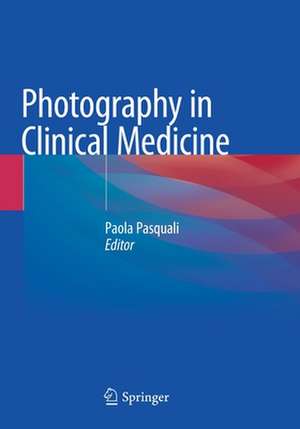Photography in Clinical Medicine
Editat de Paola Pasqualien Limba Engleză Paperback – 11 dec 2021
| Toate formatele și edițiile | Preț | Express |
|---|---|---|
| Paperback (1) | 1319.34 lei 6-8 săpt. | |
| Springer International Publishing – 11 dec 2021 | 1319.34 lei 6-8 săpt. | |
| Hardback (1) | 1649.34 lei 38-44 zile | |
| Springer International Publishing – 10 dec 2020 | 1649.34 lei 38-44 zile |
Preț: 1319.34 lei
Preț vechi: 1388.77 lei
-5% Nou
Puncte Express: 1979
Preț estimativ în valută:
252.49€ • 262.63$ • 208.44£
252.49€ • 262.63$ • 208.44£
Carte tipărită la comandă
Livrare economică 15-29 aprilie
Preluare comenzi: 021 569.72.76
Specificații
ISBN-13: 9783030245467
ISBN-10: 3030245462
Pagini: 747
Ilustrații: XVIII, 747 p. 574 illus., 456 illus. in color.
Dimensiuni: 178 x 254 mm
Greutate: 1.31 kg
Ediția:1st ed. 2020
Editura: Springer International Publishing
Colecția Springer
Locul publicării:Cham, Switzerland
ISBN-10: 3030245462
Pagini: 747
Ilustrații: XVIII, 747 p. 574 illus., 456 illus. in color.
Dimensiuni: 178 x 254 mm
Greutate: 1.31 kg
Ediția:1st ed. 2020
Editura: Springer International Publishing
Colecția Springer
Locul publicării:Cham, Switzerland
Cuprins
SECTION I: History of Medical Photography and its ancestors.- 1. Medical iconographic representations in the pre-photographic era.- 2. The Dermatology Photographic Ancestors.- 3. History of Veterinary Illustration.- 4. History of Medical Photography.- Section II: Approaching the subject.- 5. Treating with patients: the photographic approach.- 6. Doctors as subjects. Medical Imaging in Personal Branding.- SECTION III: Equipment and how to use it.- 7. Basic equipment.- 8. Basic photographic concepts.- 9. Smartphone medical photography.- SECTION IV: Special Cameras.- 10. 3D Photography Digital imaging software, stitching and stacking.- 11. Panoptic Camera.- SECTION: V Color.- 12. Understanding color.- 13. Color calibration.- SECTION VI: Photography in Dermatology.- 14. Standardizing images in dermatology Magnification Ratio.- 15. Nail and Hair photography.- 16. Digital Dermoscopy images.- 17. Total Body Photography.- 18. Dermatological Imaging – a Survey of Techniques.- SECTION VII: Photography in other medical specialties.- 19. Photography in Plastic Surgery.- 20. Photography in Ophthalmology.- 21. Photography in Dentistry.- 22. Laboratory imaging.- 23. Photography in Pathology. Photographing procedures.- 24. Photo- Endoscopy.- 25. Forensic Photography.- 26. Veterinary Photography.- SECTION VIII: Special Settings.- 27. Setting up a photographic medical studio.- 28. Intraoperative photography.- SECTION IX: Photographing the invisible.- 29. Beyond the visible - UV, IR and fluorescence imaging of skin.- 30. Thermography.- SECTION X: After photography: what´s next.- 31. Storing images.- 32. Metadata issues, DICOM standard.- 33. Coding, reimbursement.- 34. HIPPA/PHI Compliance.- 35. Submitting images for publication.- 36. Conservation, restauration and digitalization of medical images.- 37. Imaging archives for teaching, learning & research.- SECTION XI: Ethical and Legal Aspects.- 38. Ethical aspects.- 39. Legal considerations.- SECTION XII: Becoming a Medical Photographer.- 40. Formal training for the medical photographer.- SECTION XIII: Photography and the Web.- 41. Cyber security. Medical Photography and Social Media.- SECTION XIV.- 42. Deep learning performance for triage and diagnosis.- 43. Philosophy in Image analysis: Fuzzy Pictures as Philosophical Problem and Scientific Practice.- 44. Future of imaging.- Glossary of Terms.
Recenzii
Notă biografică
Paola Pasquali is a dermatovenereologist, Coordinator of the Dermatology Department at Pius Hospital of Valls. Her main areas of work are cryosurgery, skin cancer, non-invasive imaging technologies (including medical photography) and Teledermatology. She is the past president of the International Society of Teledermatology, deputy chair of the International Members Committee of American Academy of Dermatology, and member of the European Academy of Dermatology’s School. She has authored more than thirty book chapters and was invited as guest speaker in over 50 countries.
Textul de pe ultima copertă
This book explains how medical photography is part of the workflow in many specialties: it is needed for registries, to preserve information, for follow up, second opinion and teaching, among others. The book gathers information on this field, providing valuable practical tips for those that have never used photography for medical uses as well as those who use it regularly. Covering specialities ranging from dermatology, plastic surgery, dentistry, ophthalmology and endoscopy to forensic medicine, specimen photography and veterinary medicine, it highlights standardization for each procedure and relevance to ethical, patients’ perception of medical photography, cybersecurity and legal aspects. The book also presents practical sections explaining how to organize a photographic file, coding, reimbursement, compliance, use of social media and preservation as well as in depth concepts on sharp focus on blurred vision. This volume will appeal to all clinicians and practitioners interested inacquiring a high level of technical skill in medical photography.
Caracteristici
Brings together all medical specialties that use photography as part of their daily work Provides the opportunity to learn photographic tips and tricks from different perspectives Enriches our understanding of medical photography applied to all specialities














